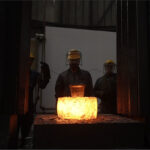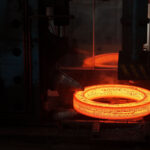
Forging has long been regarded as one of the most reliable manufacturing processes, known for producing durable, high-strength components that power industries like oil & gas, power generation, aerospace, railways, and defense. But today, forging is evolving rapidly. Driven by Industry 4.0, modern forging shops are undergoing a digital transformation, integrating Automation, IoT (Internet of Things), and Artificial Intelligence (AI) to improve productivity, quality, and traceability. At Shailesh Forging Works, we are at the forefront of this shift, combining traditional forging mastery with cutting-edge technologies to stay globally competitive. In this blog, we explore the emerging trends in forging technology and how they’re revolutionizing the future of heavy manufacturing.
1. Automation in Forging – Reducing Human Error, Increasing Efficiency
Modern forging shops now use robotics and CNC-controlled machinery to automate processes like:
- Billet cutting
- Ring rolling
- Die positioning
- Component handling
- Automated quenching
Benefits:
- Consistent output with minimal variance
- Lower rejection and rework rates
- Faster cycle times and 24/7 production readiness
- Reduced dependence on manual labor for repetitive tasks
At Shailesh Forging Works, our CNC band saws, automatic gas-fired quenching furnaces, and ring rolling machines ensure automated accuracy across every batch.
2. IoT in Forging – Real-Time Monitoring & Predictive Maintenance
The integration of IoT-enabled sensors into forging machines allows us to:
- Track real-time temperature and pressure
- Monitor machine vibration and usage
- Detect anomalies early through alerts
- Digitally log every production cycle
This creates a smart forging ecosystem where managers can access live dashboards, make instant decisions, and even schedule predictive maintenance to avoid unexpected downtime.
Outcomes:
- Better machine health monitoring
- Reduced unplanned outages
- Improved batch traceability
- Data-driven process optimization
3. AI & Data Analytics – Smarter Decisions, Better Quality
Artificial Intelligence is being used to analyze large volumes of process data to detect patterns and recommend improvements.
Use Cases in Forging:
- AI-based quality inspection using vision systems
- Machine learning models to predict defects before they occur
- Optimized die design through AI simulation
- AI-assisted material selection based on performance forecasting
AI helps in reducing human guesswork, especially in:
- Die life prediction
- Cooling rate control
- Mechanical property optimization
4. Digital Twins – Simulating Before Forging
A digital twin is a virtual replica of the forging process that allows engineers to simulate the thermal, mechanical, and material flow behavior of a forging part before actual production. This leads to:
- Fewer trial batches
- Faster tool development
- Early-stage defect prevention
- Better cost control and planning
How Shailesh Forging Works: Is Adopting These Trends
We are gradually integrating Industry 4.0 principles across our processes:
- CNC & VTL machining centers
- IoT-based furnace monitoring systems
- Real-time inspection data logging
- Computer-aided die development and simulations
- Quality traceability from cutting to packing
Our goal is to ensure global quality compliance, reduce lead times, and provide our customers with digitally tracked, defect-free forgings.
Why It Matters for Customers
When you choose a forging partner like Shailesh Forging Works, equipped with automation and intelligent systems, you get:
- Faster response to changing project demands
- Higher consistency in component dimensions and finish
- Lower lifecycle cost due to better part reliability
- Transparent production and quality records
- More agile supply chain collaboration


